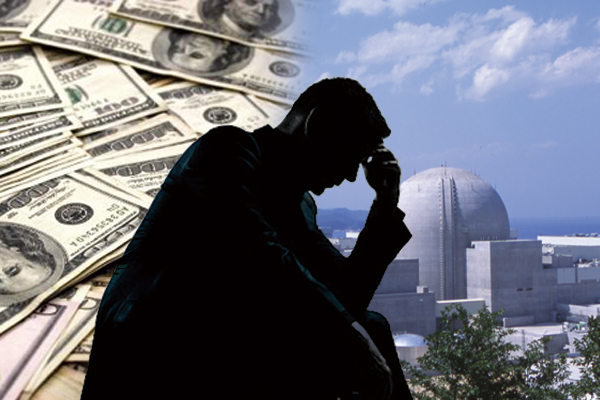The South Korean government will make up the loss from President Moon Jae-in’s nuclear phase-out policy with money collected from electricity bills. The Moon administration prematurely shut down the Wolsong Unit 1 reactor after spending 700 billion won ($631 million) for a full refurbishment. And it also stopped the construction of Shin Hanul units 3 and 4 after spending more than 700 billion won. A total of 7 nuclear power plants were affected by the government’s nuclear phase-out policy, and the loss from not operating them amounted to more than 1.4 trillion won. According to Rep. Han Moo-gyung from the main opposition People Power Party (PPP), this amount includes money spent on construction, construction contracts, operation, and maintenance.
According to the Ministry of Trade, Industry and Energy, regulations related to the electricity law were amended on June 1 and will go into effect starting from December this year. The amended regulation will use 3.7 percent of the money citizens paid for their electricity bills to make up for the loss. Currently, the government collects around 2 trillion won by saving 3.7 percent of people’s electricity bills. This is often called the electricity fund and is considered a quasi-tax. According to a survey conducted by the Korea Federation of Small and Medium Business in 2018, 63 percent of the 300 companies surveyed said electricity was their most burdensome expense.
The purpose of the fund is to develop the power industry, including by training professionals and strengthening the safety system. Some experts criticized the government for using the fund for different reasons. In fact, the government spent 48.74 percent of the fund on supporting the renewable energy sector last year, which is another key sector that President Moon is promoting as part of his nuclear phase-out policy.
“The fund should be used to improve facilities and as an investment in the power industry,” said Choi Joon-sun, professor of law at Sungkyunkwan University, in an interview with online news site Dailian. “It appears that the latest amendment to the regulation goes against the original purpose of the fund, as it was not established to make up for the damage.”
The government announced its nuclear phase-out roadmap in October 2017 and said that it will use the electricity budget to fund the plan. At that time, some experts argued that there were no legal grounds to use the budget in such a way. The 20th National Assembly tried to pass a law to help make up the loss from the nuclear phase-out policy, but was unable to do so. The current 21st National Assembly also discussed the issue, but it was not passed in the 7 months since its term began. The Chosun Ilbo newspaper reported that the administration is trying to bypass the National Assembly by amending the regulations themselves. An official from the trade ministry told the Chosun Ilbo that “we amended the regulation since we could not just keep on waiting for the law to be passed [in the National Assembly].”
The newspaper ran an editorial that read, “why do people have to pay for a nuclear phase-out policy that was taken because of obsession by a person,” referring to President Moon. “Moon announced that it will cooperate with the United States in exporting nuclear power plants abroad and still plans on keeping the nuclear phase-out policy by paying the damage with people’s taxes,” the editorial read. “It appears that Moon thinks people are stupid.” The JoongAng Ilbo newspaper argued that the government has wasted billions in taxpayer money and is trying to fix the damage with taxpayer’s money yet again.
The country’s sole nuclear power company, Korea Hydro & Nuclear Power (KHNP), can now ask the government to pay for damages incurred. The trade ministry will come up with details of the plan by early December. It plans on establishing a committee comprised of civilian experts to decide how much the government needs to pay to companies such as KHNP. Experts believe that the total damage of the government’s nuclear phase-out policy would exceed 1.4 trillion won if damage to other private companies and institutions is included. The government also is delaying the start of operation of Shin Hanul units 1 and 2 even though their construction has finished. This also contributes to the damage.
“The government pushed ahead with a nuclear phase-out policy which is totally unscientific, destroyed the nuclear power industry, and is now shifting the burden to people,” said Joo Han-gyu, professor of nuclear engineering at Seoul National University. Ohn Ki-woon, professor of economics at Soongsil University, said someone had to pay for the costs generated by the nuclear phase-out policy, and it turned out that the burden will be passed to people. “The people’s burden might increase more from now on due to possible increase in electricity bills,” Ohn added. The trade ministry, for its part, said it does not plan on raising electricity bills yet.


